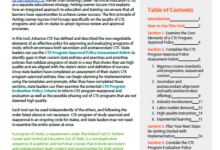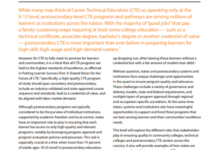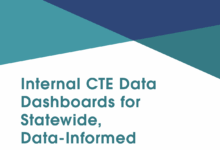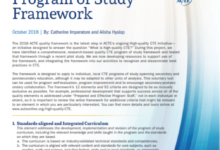In Delaware, a state policy outlines the procedures for designing Career Technical Education (CTE) programs of study, providing a structure for both state and local policymakers. Under the policy, local education agencies have the flexibility to either select and implement a state-developed program of study or develop one of their own. There are advantages to either option, and this process provides local districts the flexibility to select the programs that best suit the needs of their regional economies and the students they serve.
Delaware began to refine its program of study policy in February 2015. Staff from the Delaware Department of Education (DDOE) consulted with CTE district and school level staff as well as postsecondary and employer representatives to examine CTE programs of study across the state and develop a draft framework for program approval. After receiving public input, the framework was finalized and launched during the 2015-16 school year.
The policy outlines two options for developing CTE programs of study:
- State-model programs of study are developed by DDOE staff and can be implemented voluntarily by local school districts. These models draw on statewide labor market information and identify the course sequences, instructional strategy, skill standards, early college and career opportunities, industry credentials and student supports that are relevant within specific in-demand career pathways. Additionally, DDOE has established statewide memoranda of understanding with institutions of higher education for certificate and two- and four-year degrees to ensure that credits earned through state-model programs of study transfer to a postsecondary credential or degree.
- Locally-developed programs of study provide additional local flexibility, but are also subject to state approval and must meet certain requirements. DDOE has established a three-step process for designing and approving local programs of study. In the first phase, Development, program administrators examine regional economic data and labor market projections, which are provided by the state, convene a program advisory committee from business and industry leaders in the community, and develop an actionable implementation plan that describes the relevant Career Cluster, academic and technical standards, assessments, teacher certifications, Career Technical Student Organizations (CTSOs) and more that will be used in the program. Once complete, the plan is submitted to DDOE. The second and third phases, Implementation and Continuous Improvement, describe Delaware’s protocol for launching, evaluating and strengthening approved CTE programs of study.
Policy in Action
The policy has helped accelerate the development and adoption of statewide, industry-aligned programs of study. Since 2015, when the program approval policy was adopted, a total of 24 unique state-model programs of study across 11 Career Clusters® have been developed. Currently, state-model programs of study are available in at least 86 percent of Delaware high schools and spreading rapidly. The state aims to enroll 50 percent of all 9-12 grade students in a state-model program of study by the 2019-20 school year.
To ensure that programs continue to be high-quality, Delaware has worked to align its program, fiscal and accountability policies with its vision for career readiness. Under the program approval policy, districts must develop an evaluation plan that includes metrics and goals, which must be approved by the program advisory committee, as well as strategies to drive continuous program improvement. Districts are encouraged to set ambitious goals and share data with all stakeholders. Every program in the state is subject to rigorous review every five years, drawing on program performance data and labor market information to determine whether or not the program should be continued. Underperforming programs are identified for transition in the sixth year, at which point funds may be reduced. If no action is taken the program is then discontinued by the eighth year.
The state has also adopted career readiness indicators into its statewide and school-level accountability systems through a weighted index that includes the attainment of industry credentials, early college credit, and completion of a work-based learning course, further encouraging districts to drive toward student success.
Related Links
- Full text of policy: Delaware Department of Education: CTE Programs of Study Policies and Procedures (Aug 2016)
- Report: Raising the Bar: State Strategies for Developing and Approving High-quality Career Pathways (April 2017)
- List of Delaware CTE State-Model Programs of Study
- Delaware Pathways website
- Delaware Online: “Delaware high school job skills program grows” (2016)
Last Updated February 2019





